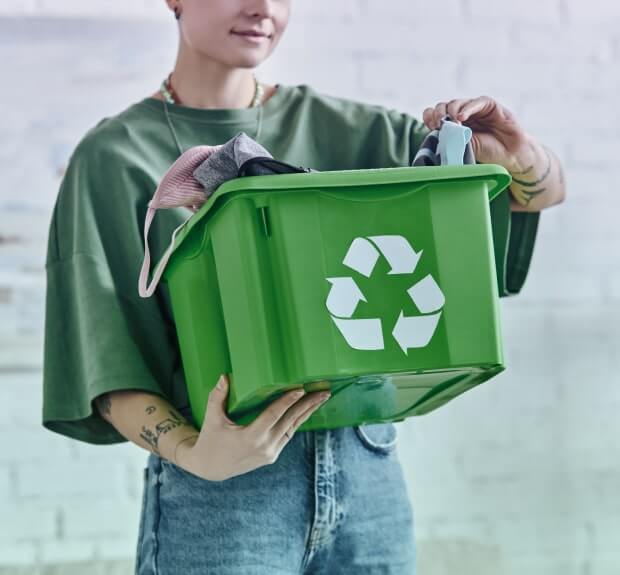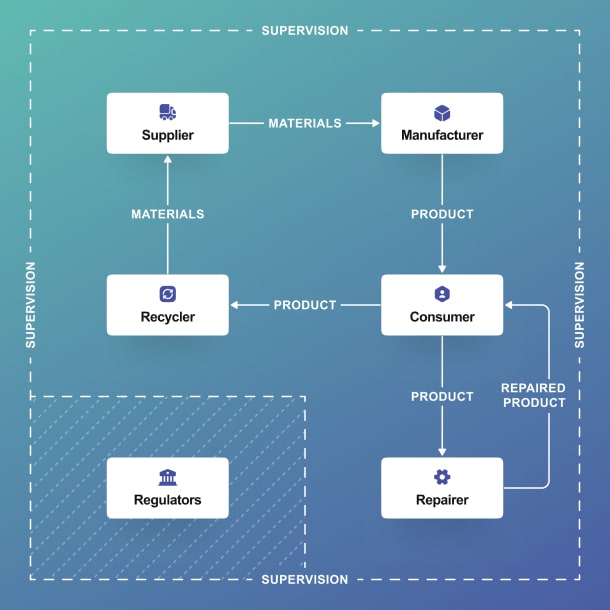
Digital Product Passport PoC for the Fashion Industry
Advanced concept for a solution to track the origin and environmental impact of fashion items
- Home
- Success stories
- Digital Product Passport PoC for the Fashion Industry
Context and background
The European Commission's Ecodesign for Sustainable Products Regulation (ESPR) is set to foster circular, environmentally sustainable practices, with a special emphasis on the fashion sector which is known for its polluting and ethical challenges.
Recognizing the urgent need for trustworthy information regarding product lifecycles, the Commission has turned its attention to the digital product passport (DPP). This forward-looking initiative, in stark contrast to fragmented certification systems and outdated tracking methods, is designed to furnish comprehensive, transparent data about the origin, impact, and safety of fashion products.
In response to this, the PixelPlex R&D team crafted our own distinctive vision for the implementation of the DPP.
Our goal was to propose a specialized workflow and technical framework that fully complies with the ESPR's goals and positions our company as one of the leaders in sustainable innovation and accountability within the fashion domain.
How can the fashion industry benefit from digital product passport implementation?
Supply chain transparency
By tracking a product from manufacture to sale, a DPP ensures supply chain transparency.
Counterfeit reduction
Unique digital identifiers ensure product authenticity and counteract counterfeiting.
Sustainability tracking
DPP technology provides data on the environmental impact of products, which fosters sustainable practices.
Compliance management
Simplified data management enables organizations to adhere to environmental and sourcing regulations.
Consumer information accessibility
Comprehensive product information in the DPP empowers consumers to make ethical and sustainable choices.
Key goals of PixelPlex’s proof of concept for a digital product passport
Our R&D team set definitive goals for the digital product passport proof of concept.
- 1
Propose our own technical vision of a digital product passport for the fashion industry
- 2
Refine the conceptual framework for the digital product passport
- 3
Elaborate on the functioning principles of the DPP and establish their clarity and conformity with the outlined concept
- 4
Assess the feasibility and suitability of the proposed architectural concepts for the DPP
- 5
Clearly outline the roles and responsibilities of key stakeholders in the DPP's future development and implementation
- 6
Lay the groundwork for the development phase and ensure that the concept is well-prepared for future implementation and testing
- 7
Facilitate further digital transformation of the goods lifecycle management in fashion and retail
Work done
- Comprehensive industry research to understand the environmental impact, ethical challenges, and lifecycle of fashion products
- ESPR regulation analysis to ensure that our DPP vision complies with the European Commission's standards for the fashion industry
- Visionary framework to evaluate the impact and advantages of specific technological implementations in the fashion industry
- Stakeholder engagement initiative to incorporate insights and feedback from manufacturers, retailers, and sustainability experts in refining our DPP framework
- Technical blueprint formulation to outline data collection, management, security, and accessibility protocols for the DPP
- Future implementation strategy development to facilitate the phased introduction and broader adoption of the DPP in the fashion industry, starting with pilot projects

Introduce your vision for tailored business solutions and expert insight
Technical approach
Our team's approach to the digital product passport in the fashion industry centers on implementing blockchain and non-fungible tokens.
We’ve selected these technologies for their specific capabilities that match the industry's need for authenticity, security, and efficient tracking.
Blockchain
We propose using blockchain due to its capability to create an immutable and decentralized database. It ensures the integrity and traceability of product data in the industry where the supply chain's transparency is often compromised.
Every transaction or change linked to a product will be recorded on the blockchain, thus establishing an unalterable history that boosts trust and accountability.
NFTs
In our concept, NFTs offer a technical solution for assigning a unique digital identity to each fashion item. They enable a secure and reliable method of verifying product authenticity, in contrast to conventional serial numbers or barcodes that are susceptible to duplication.
Plus, NFTs could be used to store and access comprehensive product information, including details about its design, manufacturing process, and material sources.
Ecosystem participants
In the course of developing the proof of concept for a digital product passport for the fashion industry, our research and development team has agreed upon and established an ecosystem comprising the following essential stakeholders:

Supplier
An individual or entity operating within the fashion industry and responsible for the procurement, transportation, management, and distribution of resources and materials needed for the production and supply of fashion-related products.
Manufacturer
An individual or organizational entity engaged in the fabrication and production of goods intended for commercial distribution. The role encompasses the transformation of raw materials into finished products through a combination of labor, machinery, tools, and chemical or biological processing or formulation.
Consumer
An individual who acquires goods or services for personal use. The consumer's purchasing decisions are influenced by personal preferences, budget, and the need for specific goods or services.
Recycler
An individual or business entity specializing in the collection, segregation, processing, and conversion of discarded materials into reusable raw materials. This process is essential for environmental sustainability, as it significantly reduces waste, conserves natural resources, and minimizes ecological impact.
Repairer
A professional skilled in restoring and maintaining a variety of equipment, machinery, as well as fashion items, and adept at diagnosing and resolving functional issues to extend an item's usability.
Regulators
Individuals or organizations endowed with the authority to supervise and govern a particular activity or process. Their primary function is to ensure compliance with established standards and regulations, thereby safeguarding the public interest and maintaining the integrity of the industry or sector they oversee.
Core constituents of a digital product passport ecosystem
Upon establishing the main roles within the ecosystem, we proposed the development of a specialized application for the actors.
1
Manufacturer portal
In the manufacturer portal of our digital product passport ecosystem, manufacturers can prepare and upload detailed information about the product, including:
- Basic product data such as product name, model, batch number, manufacturing date, and warranty details
- Material data that covers the origins of materials and components, along with supplier details
- Ownership data containing information on current and previous owners for resale purposes
- Repair details about product repairability and specific repair histories
- Sustainability data encompassing the carbon footprint of manufacturing, distribution, and usage
After inputting the data into the system, it automatically mints NFT tokens associated with the product data and creates a unique digital identity for each product. This digital product passport, accessible via a QR code on the product label, ensures traceability and accountability throughout the product's lifecycle.
Regulators can also access this data through the public blockchain by scanning the QR code and comparing the provided information from manufacturers and recyclers against actual data.
2
Consumer application
Our R&D team has also envisioned a specialized consumer app as a core component of our digital product passport technology proof of concept.
Through this app, when a product is ready for recycling, the recycler can scan the QR code to retrieve its digital product passport which would reveal the product's material composition in detail. The recycler then records the recycling process in the portal, thus updating the product's digital footprint and effectively completing its sustainable lifecycle.
3
Recycler portal
Following the consumer's recycling of the product and its arrival at the recycling center, the facility conducts a QR code scan to retrieve the digital product passport that contains a wealth of information regarding the product's materials.
Then, the recycling center records data in its portal, detailing the product's recycling process and easily adding this information to the product's existing dataset.
Expected benefits and opportunities
Secure product histories
Blockchain will store the history of fashion items, providing manufacturers with dependable records and assuring consumers about the ethical production and authenticity of their purchases.
Reliable authenticity verification
The industry will be able to assign a unique non-fungible token to each item, verifying its authenticity and ownership history. This is particularly important for high-value or limited-edition pieces.
Elevated sustainable practices
Consumers who recycle and manufacturers who follow ethical standards can receive tokens for rewards, which fosters environmentally friendly behaviors.
Applications tailored for stakeholders
- Consumer apps will offer detailed product information and recycling tips
- Recycler apps will facilitate material identification and environmental impact tracking
- Manufacturer apps will aid in supply chain tracking and inventory management
Transparency and brand loyalty
Providing clear details about the product lifecycles and ethical practices, along with the introduction of token rewards, will likely foster deeper consumer connections and loyalty to brands.
Innovative technology as a differentiator
The use of blockchain and NFTs for product authentication and sustainability will set brands apart in the fashion industry and establish them as leaders in transparency and environmental responsibility.
Simplified supply chain management
Blockchain technology will simplify supply chain processes and enhance material tracking and production standard verification, thereby increasing efficiency and regulatory compliance.
Insights on behavioral patterns
Insights gathered from these technologies will inform future strategies by providing data on consumer behavior, recycling patterns, and manufacturing efficiency.
Data-driven decision-making
The integration of intelligence tools makes it possible to optimize inventory management, minimize transportation costs, and make strategic choices that enhance the efficiency and sustainability of supply chain operations.
The rationale behind PixelPlex's proposal for a digital product passport in fashion
Proven expertise in delivering sustainable solutions
Our team has successful experience with sustainable solutions. The most recent achievement is the creation of a blockchain-powered recycle-to-earn ecosystem that integrates with reverse vending machine (RVM) software and features a sophisticated tokenomics model.
This solution has laid the groundwork for a high-end ecosystem that ensures effective collaboration among all stakeholders, including consumers, recyclers, and manufacturers, optimizes the entire plastic recycling process, aims to reduce pollution levels, and drives consumer behavioral change towards more sustainable practices.
Genuine desire to make the world a better place
PixelPlex acknowledges the potential for sustainable innovation within the fashion industry. Our R&D team is dedicated to utilizing cutting-edge technologies to enhance transparency, efficiency, and environmental responsibility in this field.
Our primary objectives include improving the authentication and provenance verification of fashion items and actively contributing to environmental conservation efforts within the sector. This initiative emphasizes our resolute commitment to sustainable practices and our strong desire to positively influence the fashion sector within our capacity.
Services
We offer a comprehensive range of services, including IT consulting, custom software development, and specialized expertise in blockchain, machine learning, and data science.
Blockchain Development
Blockchain Development
Smart Contract Development
Web3 Development
Blockchain Game Development
Crypto Payment Solutions
Tokenization Services
Protocols
Protocols
Cryptocurrency Exchange Development
Cryptocurrency Development
Marketplace Development
Dapp Development
DeFi Development
Top Development Company
Blockchain Consulting
Smart Contract Audit
Top Blockchain Consulting Company
Custom Software Development
Custom Software Development
Mobile App Development
Web Development
Top IT Services Company
IT Consulting
Top Consulting Company
ML Development
Artificial Intelligence Development
Machine Learning Development
Data Science Development
Top BI & Big Data Company
AR & VR Development
AR & VR Development
QA & Software Testing
QA & Software Testing Services
UI/UX DesignGive us the pleasure of adding our secret sauce to your app.
We’ll create beautiful screens at the front while breaking the limits of what’s behind them to help your app get to beyond-plausible business achievements.
UI/UX Design Services
MVP DevelopmentValidate your product idea quickly with an MVP—launch faster, test smarter, and refine based on real user feedback.
Leverage our expertise in MVP development to build a scalable, market-ready product with minimal risk and maximum efficiency.
MVP Development Services
Metaverse Consulting & Development
Top Development Company
Solutions
RWA PlatformTokenization makes it easier to trade assets and opens up new investment opportunities and diversifies portfolio.
RWA Platform
Asset tokenization platform development
Arbitrage BotProfit from market inefficiencies with automated, customized trading strategies that boost returns and minimize risk.
Arbitrage Bot
Be a transaction ahead. Catch profit at short notice
CryptoAPIGain an unfair data edge for your dApps. Tap into high-quality blockchain insights to outsmart competitors and fuel smarter decisions.
CryptoAPI
Connect your dApps to blockchain networks in a flash
OTC HawkOffer high-net-worth clients a secure, enterprise-grade trading terminal. Streamline deals, enhance reliability, and optimize top-tier crypto assets.
OTC Hawk
Benefit from our portfolio and wealth management app
DocFlowManage sensitive documents on blockchain. Leverage optional zero-knowledge proofs for trust, privacy, and streamlined workflows.
DocFlow
Intuitive Blockchain-Powered Document Management System
Know-Your-TransactionEnsure every transaction is above board. Monitor digital asset flows for compliance and transparency, supporting both businesses and regulators.
KYT crypto platform
Our KYT platform fosters integrity of financial ecosystems
Industries
We work across a variety of industries, from FinTech to eCommerce, leveraging our accumulated knowledge and best practices to deliver solutions tailored to the unique needs of your business.
FinTech & BankingAs traditional finance goes digital, we are committed to building efficient ecosystems and better engagement.
Think of customized FinTech solutions with tamper-proof transactions and storage, progress transparency and automation — and we’ll make them see the light of day.
$25T
Global Financial Services
20%
Digital/Blockchain Growth
Solutions for FinTech & Banking
PaymentWe build secure and seamless payment software solutions that increase revenue, reduce friction, and scale with your business.
If you're integrating payments into your platform and need a team with deep financial technology expertise, we'll help you engineer transactions with precision and reliability.
$9.5T
Global Digital Commerce Value
30%
Growth in Embedded Finance
Payment
Retail & eCommerceWhether you market B2B or B2C, commerce tech trends are all about value-driven purposes, global sustainability, hybrid shopping journeys, and extra-resiliency.
Let your clients know that there’s more to your brand than meets the eye by creating unique customer experiences in all your stores.
$6.3T
Global eCommerce
10-15%
Tech Innovation Growth
Solutions for Retail & eCommerce
Supply Chain & LogisticsTo make things easier for all vendors, we deliver apps for route and cost optimization, vehicle operational support, and better dispatch time efficiency.
With focus is sustainability, resilience, transparency, and immutability, let’s get your transformation going.
$10T
Global Logistics
15-20%
Blockchain Adoption Growth
Solutions for Supply Chain & Logistics
HealthcareCustom healthcare software solutions are aimed at helping you ensure accurate diagnosis, better patient engagement, and positive healthcare outcomes.
Whether you require a patient management solution, practice management software, EMR/EHR system, or ML-enabled diagnostics – we’ve got you covered.
$10T
Global Healthcare
20%
Digital/Blockchain Growth
Solutions for Healthcare
Real EstateKeep up with digital innovation trends by accelerating enterprise transformation and scaling, leveraging data and orchestrating workflows.
Whether you manage and sell commercial facilities or invest third-party capital, our integrated solutions help you make the most of it.
$340T
Global Real Estate
15%
PropTech/Blockchain Growth
Solutions for Real Estate
Oil & GasWith mobility and digital technologies standing to change the game and define leadership, our mission is to get you digital-first.
Resolve operational and conceptual issues by introducing clear tech vision, feasible architectures, and flexible software to take business extension off limits.
$4T
Global Oil & Gas Industry
10-15%
Digital/Blockchain Growth
Solutions for Oil & Gas Industry
InsuranceImagine a world where quoting policies, processing claims, and managing mountains of paperwork are effortless. PixelPlex can help you achieve just that.
Break free from outdated systems and focus on what truly matters – delivering exceptional service to your policyholders and growing your insurance business.
$25T
Global financial services
20%
Digital/blockchain growth
Solutions for Insurance Industry
FitnessWe create custom fitness software solutions that support meaningful training and steady engagement from the first session.
If you’re building a digital product for active users and need a team with real project experience behind it, we’ll help you bring it to life with clarity and purpose.
$257B
Global Fitness Industry
24%
Digital Growth
Solutions for Fitness
BankingFinancial systems face continuous change and ongoing scrutiny throughout their lifecycle as products evolve.
Our solutions are designed to stay predictable under regulatory oversight and daily operational load, helping teams build systems they can rely on.
$191T
Global Bank Assets
62%
Digital Payments Use
Solutions for Banking
RestaurantCustom restaurant management software allows for reducing costs, smooth internal CRM and delivery systems integration, and easy scalability.
We develop restaurant ecosystems that turn your complex business data into actionable insights that the whole team can understand and use.
$4.2T
Global Food Service Market Value
+7.2%
Annual Growth Rate
Solutions for Restaurant
TravelCustom software development for travel helps agencies to get rid of fragmented operations and make decisions based on data, and with an aim of future growth.
We offer travel software solution development services that transform internal operational data into clear, actionable insights that the whole team can use.
$9.5T
Global Travel & Tourism Market Value
+5.8%
Annual Growth Rate
Solutions for Travel
Success stories
Domain
Industry
Protocols
Company
About us Team Careers Social Responsibility ContactsBlog
Blockchain Big Data Artificial Intelligence AR/VR Mobile News View Blog
